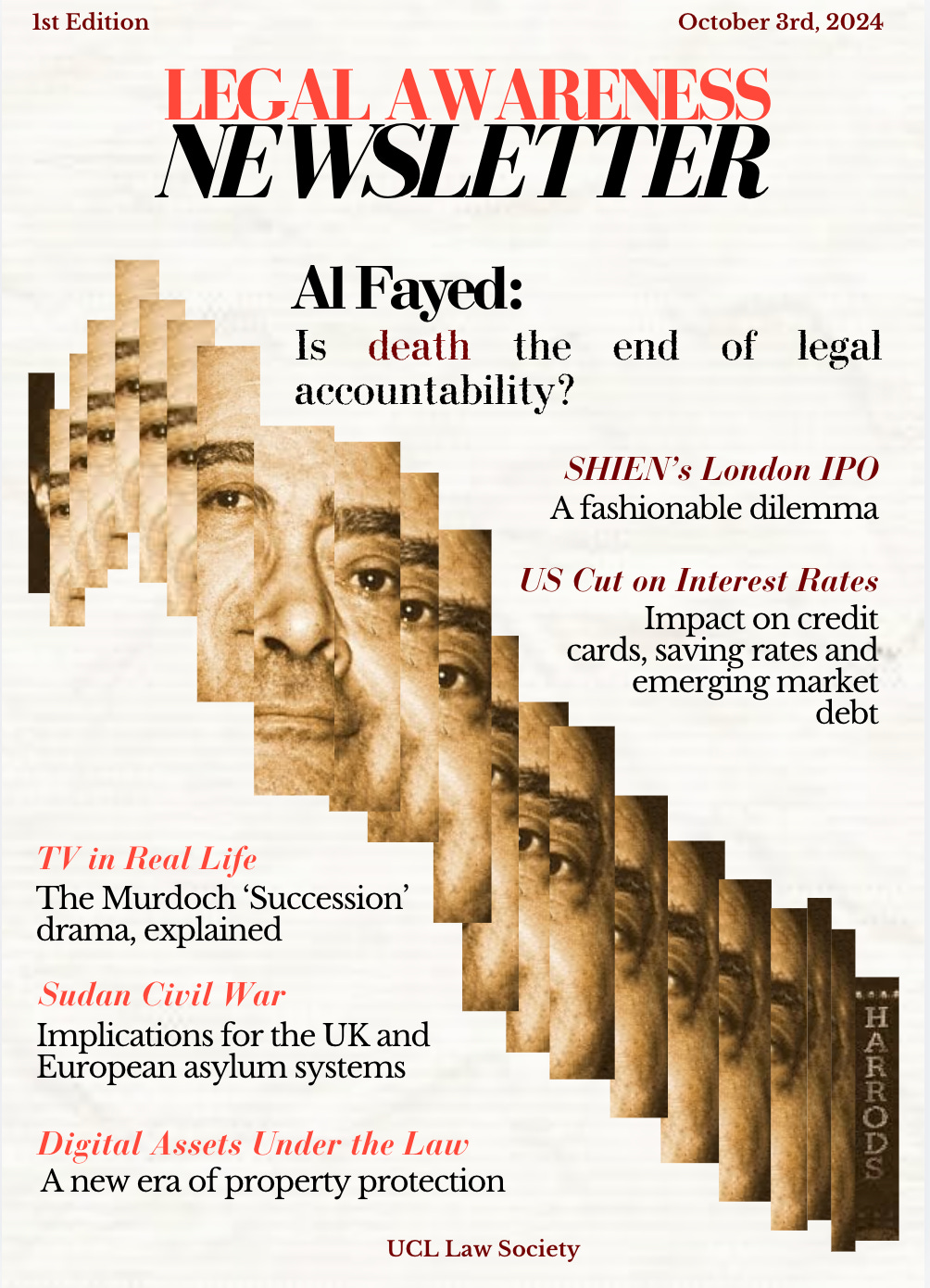Hello! Welcome to the first LAN of the year. I’m super excited for you to get a chance to read the great pieces our writers have put together. We have six articles, on a range of topics. These include Al Fayed’s abuse; the Murdoch family succession drama; and an exploration of Shein’s IPO attempts.
This year I’ve decided to introduce a commercial section to the newsletter, with commercially focused articles from a range of jurisdictions. Furthermore, there will be a breakdown of key commercial terms and links to other articles which you can use to improve your commercial awareness. As such, this new section is a great tool for Law firm applications. Please give it a read!
I’m also excited to be saying that from our next edition, we will be adding graphics throughout the LAN.
And happy Mean Girls day!
All the best,
Jago Cahill-Patten
Publications Officer
General Section
Al Fayed - Is Death the end of Legal Accountability?
Sam Schajer
Background
On the 19th September 2024, the BBC released a documentary compiling the sexual abuse claims made against Mohamed Al Fayed by over 20 women. At the time of writing, 60 women have joined the claim against Al Fayed.
One victim said that when recruited, instead of being given training, she was raped and held against her will repeatedly.
Harrods themselves faced damning allegations for helping to conceal and facilitate the actions of Al Fayed. Harrods effectively operated as a human trafficking front for Al Fayed because he recruited women into the organisation just to abuse them, and moved them around within the organisation in order to facilitate this.
Multiple people in the organisation are said to have witnessed the abuse, but they did not stop Al Fayed or contact the police. Two women said that in order to work at Harrods they were subject to a full gynaecological exam, as well as HIV and STD tests conducted by Dr Coxon. They claim that Dr Coxan then shared the results with Harrods and Al Fayed, so he could sexually assault them without concern for his health.
Possible Legal Proceedings
Because Al Fayed died last year there will be no criminal trial. However, the Metropolitan Police have said that they are carrying out extensive investigations into whether other individuals within Harrods could be prosecuted. Dr Coxan is also being investigated by the General Medical Council.
Equally, lawyers representing the women are considering if action could be taken against the Metropolitan Police for failing to prosecute Al Fayed when the claims were originally made.
Lawyers at Leigh Day are examining whether Harrods could face legal claims for negligence; as well as for negligence and assault resulting in rape and serious physical and mental injury. A global civil lawsuit will be brought against Harrods for failing to protect its female employees from abuse, and for enabling Fayed to sexually abuse these women at work. Harrods today, which is under different ownership to at the time of the abuse, has already accepted vicarious liability.
Complicating factor of the NDAs
A complicating factor is that some of Al Fayed’s victims were asked to sign NDAs. In the past this complicated investigations into sexual abuse because it prevented victims sharing necessary evidence. However, in March 2024, the UK government changed the law so that now an NDA cannot be enforced if the NDA will prevent the reporting and investigation of a crime. Furthermore, the new owners of Harrods have made clear that they will not enforce the NDAs.
Potential Remedies
The potential outcome of all of this is a significant payout to the women to compensate for the horrific abuse they faced and serious long term physical and mental consequences. It is hoped that those who helped facilitate Al Fayed’s abuse will be brought to justice and that the system that enabled Al Fayed to abuse will be exposed.
When the TV Show Becomes Real Life. The Murdoch Succession Drama Explained
Oskar Puntmann
In a Nevada courtroom, family drama is afoot. The children of an aging media mogul are putting their best foot forward to try and retain control of their father’s conglomerate. Incredibly, this isn’t a TV show, this is real life. Namely, the Murdoch family are battling it out in Reno over the future of News Corp and Fox. These companies own various news sources, such as Sky News Australia, The Sun and Fox News.
The Basis of the Case
As it currently stands, on the death of Rupert Murdoch, the voting shares in his companies are to be evenly split between his four children. Murdoch has sought to amend the trust, however, in order to give his eldest son Lachlan full voting rights. The reasoning for this appears to be the divergence of political values within the family. The Murdoch conglomerate is inherently conservative and right-wing, a positioning which has proven especially profitable and commercially viable. Lachlan is seen as most aligned with those views, whereas his siblings appear to be more progressive. James for instance, endorsed Kamala Harris and has donated to progressive groups. Lachlan’s political leanings have also led to him having been appointed chair of News Corp and CEO of Fox News, due to his favour with Rupert Murdoch.
According to Probate Commissioner Gorman Jr, who is ruling on the case, the trust, which was created to be irrevocable, can only be amended if it is proven that such an action would be in good faith for the sole benefit of the heirs. This could be the case if it were proven that giving all voting rights to Lachlan would improve the value of the companies, and thus benefit all of the heirs financially or otherwise. This may be difficult to prove, with much of the possible benefit from such a move being currently speculative. The other siblings may, however, argue that Lachlan’s leadership has already been harmful to the companies. For instance, through the Dominion lawsuit in 2023, leading to Fox paying Dominion $787 million.
The Significance
This case will determine the trajectory of News Corp and Fox for the following decades. Fox News, for instance, is the most watched cable news channel in the US, and thus an unbelievably influential source politically. It has achieved this by presenting itself as conservative, thus attracting a specific audience. If Rupert Murdoch loses, a shift to the centre may arise with the other more politically progressive siblings being able to outvote Lachlan.
Thus, the outcome will establish whether the Murdoch companies remain on their right-wing path, or whether they start to shift towards the centre. Such a shift could be detrimental for the Murdoch conglomerate in our current streaming era, where cable news viewership and newspaper readership are decreasing steadily. It could be an added force to deplete their viewership and may lead to a world where Fox News is no longer the Trump channel.
Civil War in Sudan: Implications for the UK and European Asylum Systems?
Aykhan Allahveranov
The most recent civil war in Sudan began in April 2023, ignited by a power struggle between the Sudanese Armed Forces (SAF) and the Rapid Support Forces (RSF), a powerful paramilitary group. Tensions escalated over military reforms intended to integrate the RSF into the national army. The conflict has led to widespread violence, significant civilian casualties, and mass displacement. While the fighting is estimated to have killed 150,000 people, reports suggest around 10 million people (a fifth of Sudan’s population) had to flee their homes. Those that remain, face deteriorating humanitarian conditions. More than half the country’s 49 million population suffer life-threatening acute food insecurity. Efforts to restore law and order are likely to flounder as regional and international actors look to compete for power and influence in a land that is one of Africa’s top gold producers.
Will Europe and the UK witness another refugee crisis? If so, are we prepared? Reports suggest that most Sudanese nationals escape to Chad, South Sudan and Egypt. Those hoping to reach Europe, do so mostly through Morocco, Libya or Tunisia. The European Union (EU) in turn has braced itself for another refugee crisis by cooperating with the states south of the Mediterranean. The Libyan Coast Guard, supported by the EU, is tasked with decreasing the flow of migrants towards Europe. Moreover, the EU has paid over $115mn to Tunisia to tighten its borders to prevent the migrants crossing the sea. The EU has succeeded in avoiding a crisis akin to that of 2015, though not without incurring significant moral costs. By building a series of physical and legal walls across the Mediterranean, the EU has not made it easier for refugees to escape war and conflict. This is particularly concerning, as many Sudanese nationals report police brutality, detention and deportation by Libyan and Tunisian officials. Whatever its merits, the policy of cooperation with the North African nations is unlikely to bare well with the 1951 Geneva refugee convention, to which the EU is a long-standing signatory.
As for the UK, it granted asylum to just under 4,000 Sudanese nationals in the year ending June 2024 at a grant rate of 99%. Sudan is the eighth-largest nationality by the number of applications granted asylum in the UK. The longer-term resilience of the UK asylum system remains to be seen. It is not looking optimistic, however, as the UK Law Society’s research suggests that across England and Wales, 63% of the population do not have access to an immigration and asylum legal aid provider. Submitting an asylum claim is not like filling out any other application. As more escape the clutches of the civil war, lack of legal aid may result in a drop in the success rate of asylum applications lodged by Sudanese nationals. This may place further strains on an asylum system with a caseload of 224,700, as of June 2024.
Digital Assets Under the Law – A New Era of Property Protection
Max Currie
‘Short and sweet.’ That is how best to describe the Property (Digital Assets etc) Bill that was put before the House of Lords on 11 September 2024. The bill aims to improve the protection of digital assets, such as cryptocurrencies and non-fungible tokens (NFTs), by allowing them to fall under the scope of the UK’s stringent and robust proprietary ownership system.
The bill only has one real provision. Section 1 provides that objects, especially digital ones, can be given personal property rights even if they are not “things in possession” or “things in action”. For a brief background on what exactly this means, a summary of some precedent is needed. In the case of Colonial Bank v Whinney, from 1885, the House of Lords held that property rights could only be granted to objects if they fell into one of two categories. An item must have either been a physical object, such as a gold bar or necklace (things in possession), or something that could be claimed through legal actions, such as a debt or mortgage (things in action), to fall under the law’s protection. Outside of this, no other objects had protection under English law’s personal property rights.
The proposed legislation will ‘free up’ the development of the law from this outdated definition of property in Colonial Bank, a direction in which the common law and the judiciary were already headed. In 2019, in AA v Unknowns Persons, the High Court ruled that Bitcoin had proprietary rights, at least for the purpose of serving an injunction to individuals who received Bitcoin after hacking a company’s systems. This is not saying that anything could be property, and it is not making massive changes to the law. It is merely proposing to confirm, in statute, that digital assets can be considered property, even if they do not fall into one of the previously accepted categories.
So, what does this mean for digital assets and their owners? As the incoming first-year students will soon learn (spoilers ahead!), proprietary rights are enforceable against everybody. By offering digital assets this level of protection under English property law, the ownership of everyone who holds them is more secure. Let’s say someone manages to steal some cryptocurrency from your online wallet. With the currency being considered property under UK law, you will have a greater range of rights available to track them down and try and get your money back.
This change is massively beneficial for the victims of scams and phishing attempts, as well as potential investors. Being one of the first jurisdictions to propose such a law, the UK will hopefully see an influx of investors wanting to hold their online assets under the protection of this new legislation – bringing much-needed economic stimulation to the country.
Overall, the Property (Digital Assets etc) Bill is a welcome proposal by the Ministry of Justice and marks a significant change to the longstanding rules on personal belongings for one of the world’s oldest property law systems.
Commercial Awareness Section
IPO:
Short for ‘initial public offering’. When a privately owned company goes public and lists its shares on a stock market, allowing members of the general public as well as institutionalised investors to buy shares. This often means the company now has to follow government-mandated disclosure rules. In the UK, the Financial Conduct Authority (FCA) governs any potential IPOs, prioritising promoting competition and avoiding volatility. This then renders the company in question applicable under a ‘governance regime.’ This is the way in which a publicly listed company is required to disclose and manage financial information, including compliance, corporate governance, and operations. Apart from Shein’s IPO application, recent notable IPOs have included Raspberry Pi, which surged in profits after the listing due to institutional investors prioritising tech investment. Law firms provide advice after conducting due diligence to ensure compliance with FCA guidelines as companies go through IPO proceedings. Before Shein’s New York Stock Exchange Listing fell through, Skadden, Arps, Slate, Meagher & FLom was advising the clothing giant through IPO complexities.
Sharanya Trivedi
SHEIN’s London IPO: A Fashionable Dilemma
Adrien Charles
Earlier in June, it was reported that SHEIN - the poster child for fast fashion - filed the initial paperwork with the Financial Conduct Authority (FCA) to list on the London Stock Exchange (LSE). This decision follows the derailment of SHEIN’s plan to list on the New York Stock Exchange (NYSE) due to escalating tensions between the United States and China. Valued at an estimated £50 billion, the potential listing has proved a divisive issue in the context of London’s waning position in the IPO market.
On the one hand, SHEIN’s potential listing could mark a much-needed turnaround for the LSE. Over recent years, a number of companies have either delisted from the LSE or opted to list elsewhere due to concerns about being undervalued. ARM Holdings, the UK-based chip designer, is a recent example of a major IPO which have could have been London’s. Given the size of SHEIN, the company’s IPO is certainly an alluring addition to the LSE. The online fast-fashion retailer boasted an estimated £24.3 billion in revenue in 2023, a staggering 43% increase on the £16 billion it made in 2022. The company’s estimated valuation would make its listing the largest ever London stock market flotation. With the London market accounting for only 5% of IPOs globally between 2015 and 2020, a flotation of this magnitude would inject much-need momentum into the LSE. Securing the listing of a global brand like SHEIN would signal that London can still draw in major international companies post-Brexit, despite the competition from other financial hubs.
On the other hand, a SHEIN IPO could be a major faux pas by the LSE in attempting to bolster its competitive ability in the market. Whilst SHEIN is renowned for its rapid turnover of ultra-affordable clothing, the online retailer often draws more attention for its controversial labour and human right practices. The company recently made headlines after allegations surfaced that it sourced cotton from fields where Uyghur Muslims where subjected to state-imposed forced labour. This has led Amnesty International UK to label the potential listing as a “badge of shame” for the London market. Indeed, while SHEIN’s IPO might offer short-term boosts to the LSE in terms of capital raised and market activity, the long-term implications of associating with a controversial brand could outweigh these benefits, particularly if more light is shed on the company’s supply chain and business practices. From the perspective of an investment fund manager, holdings in SHEIN could also prove reputationally problematic as they come under ever-increasing scrutiny over the governance of the companies that they invest in. Lastly, the fast fashion industry is vulnerable to market shifts, evolving consumer preferences, and regulatory crackdowns. This instability could lead to a poorly performing IPO, further damaging the LSE’s reputation.
For now, the IPO’s fate is in the hands of the FCA. The outcome will spotlight the true weight of ESG considerations in the UK, at a time when the London market is in dire need of a pick-me-up to help sustain the LSE’s competitive edge. A rejection could finally encourage companies with similar business models to improve transparency and sustainability efforts, though critics might dismiss these efforts as greenwashing.
Bonds:
A type of direct debt financing usually involving a fixed-income repayment plan, where the return is paid at fixed intervals without variable short term interest rates. This provides a sense of security and certainty on the exact return value at the end of the interest repayment period. Bonds are usually used by both governments and companies, to raise funds for public financing. These bonds are raised by debtholders who ‘own’ the debt and can demand return on their investment. Bonds can also be sold on the bond market, where prices can fluctuate according to market forces. If a debtholder holds a bond to maturity without selling it on the market, they can claim their principal amount invested along with interest - this is called yield-to-maturity. Bonds are usually far less volatile than stocks on the stock market, but provide lower returns so are safer, lower-risk and lower-return investments. Debt financing capital market practice areas of law firms often deal with both government and corporate bonds. Linklaters, for example, advised the state of Tunisia on raising $1 billion in government bonds amidst a volatile post-Arab spring MENA economic stage.
Sharanya Trivedi
Recent cut of interest rates in the US, September 2024
Jessica Li
For the first time in more than four years, the US central bank has lowered interest rates with a larger-than-usual cut. The Federal Reserve has cut interest rates by 50 basis points which has reduced the federal fund rate to a range of 4.75% - 5%. This pivotal decision to lower a key lending rate has led to notable market reactions. Following the announcement, US equities were higher in the afternoon of September 18th, while bond yields declined. Against this backdrop, US banks have benefited significantly from recent interest rate hikes, estimated at approximately $1 trillion, though competition and economic pressures might change the landscape as rates begin to fall again. Nevertheless, bank stocks reacted positively to the recent rate cut, with investors predicting it will boost borrowing demand and investment banking activity.
Emerging Markets Investing
Furthermore, the cut on interest rates has also eased the pressure on indebted emerging markets and increased demand for local currency bonds. Central banks in emerging markets hope this new cut on interest rates will help local currency bonds and that they will have more room to cut their own base rates, in order to respond to their local inflation profile. For example, the South African Reserve Bank has cut interest rates for the first time in 5 years by 0.25 percentage points to 8%, whilst in Indonesia a similar cut in rates also occurred.
The Impact of Cutting Interest Rates for Corporate Transactions
One of the major impacts that having a lower interest rate is that the cost of borrowing is reduced. As such, this means it is easier for companies to take advantage of cheaper debt to finance expansions or acquisitions. Lower financing costs can encourage companies to undertake strategic initiatives that were previously viewed as financially prohibitive, thereby stimulating economic growth and innovation. Such a result also has an impact on private equity firms or companies seeking to acquire new assets, which may lead to new deals being made.
The Impact of Cutting Interest Rates for Real Estate and Financing
Within real estate, lower interest rates also can stimulate increased demand for property as both individuals and businesses find borrowing more affordable. As borrowing becomes more accessible, the real estate sector may witness increased transactions, leading to potential price appreciation and the revitalisation of previously stagnant markets. What this may mean for commercial lawyers, is an increase in financing agreements and reconstructing deals. It is predicted that if the Federal Reserve continues to lower rates by at least 25 basis points at subsequent meetings in 2024, more significant movement in the commercial real estate (CRE) market may occur by early 2025.
In conclusion, the recent interest rate cut by the Federal Reserve marks a significant shift in US monetary policy, with far-reaching consequences for both domestic and global markets. Commercial lawyers will be vital in navigating the complexities of financing arrangements, lease agreements, and regulatory compliance in the evolving market.
Links to More Articles:
Sharanya Trivedi
California Governor Vetoes A.I. Legislation:
California Governor Gavin Newsom vetoed a comprehensive AI legislation bill which required safety testing of AI systems before public release, arguing that even the most basic AI functions were too limited. California was expected to set precedent for the US as a whole in terms of appropriate approaches to AI legislation. This will undoubtedly have deep-set impacts into the way Western countries, including the UK, approach AI.
UK Business Confidence Lowest Since Election:
As Labor warns of a tight budget for the last financial quarter of the year, consumer and corporate confidence has fallen by three points. This sentiment is shared across sectors, with leaders preparing for recessionary and turbulent behaviour.
Bank of England Highlights Inflationary Pressure:
Amongst an already uncertain economic outlook, the Bank of England’s Chief Economist has emphasised economic uncertainty regarding interest and inflation rates. Calling inflation ‘persistent’, he may be pre-empting a restrictive monetary policy.
FTX Class Actions to Proceed:
FTX plaintiffs and claimants have reached a deal regarding who owns the right to sue on behalf of customers. Although class actions will likely continue, the question of the ownership of the claims by FTX customers against former FTX personnel, and whether they belong to FTX or to the customers, is unresolved.











Whoever wrote that Digital Assets article is such an inspired author!
Great first edition!